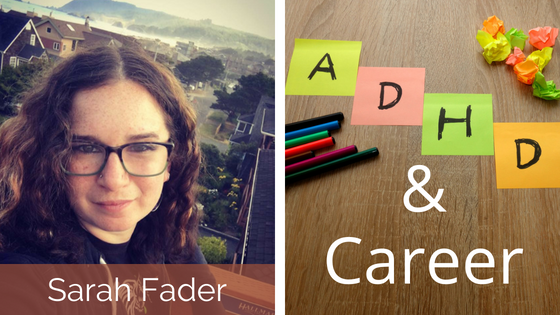
For many years I could not hold a job. I did not know why because at the time I didn’t realize that I had ADHD. It is only one of my mental illnesses, and it is the condition that gets me fired from countless jobs. I have trouble with time management and finishing work and things that require me to focus. It’s exhausting having ADHD for a multitude of reasons. One is that nobody believes that it’s isn’t true, but enough people do to make it difficult to function in the world.
What if you had cancer and when you told people about your disease they said, “That’s not real!” Think about how you might feel. Sad, angry or possibly invalidated? That is how I feel when I work in any job where my colleagues or supervisor do not believe that my symptoms are related to my disability. I don’t indicate that I have a disability to my job. I have shame associated with ADHD and I don’t want to be treated differently. It’s not fair that I can’t focus. It isn’t just that I was born with a genetic set of brain garbage that makes it hard for me to hold down a job.
I used to make excuses for my issues at work. I make a conscious effort to curb that impulse now; I use techniques that I learned in therapy in order to circumvent the symptoms that I have. For example, the Pomodoro technique helps me. This method is something that allows me to structure my workday. I work for 20 minutes and I take a break for 10 minutes. It makes me feel like I have something to look forward to and I don’t have to keep continuously working.
One of the accommodations that helps people with ADHD function better at work is to have scheduled breaks. People like me that have ADHD are easily bored. So, knowing that I have something to look forward to is essential.
Once I got my diagnosis when I was 24 years old it was easier for me to understand my struggles, but I didn’t necessarily walk a smoother career path. There were many failed attempts at keeping a job. I resisted taking medication for ADHD, because I felt weak, less than, like a loser or deficient. Finally, I made the choice to take a stimulant. It changed my life.
I have a great job now. I use my structured schedule to make sure I get tasks done. And if I’m running late on something, I communicate with my supervisor. When I started my position, my boss said his core values were honesty and communication and that is what I strive for at work. Regardless of what your disability is (or even if you don’t have a disability) being honest with your supervisor is essential. Tell them what’s going on and your work relationship will remain strong.
In some ways I consider my multiple mental health disabilities to be an advantage. ADHD gives me the ability to hyper-focus and get things done when I’m interested in a task. I liken the ADHD brain to a car. My default state is neutral. The goal is to get my brain to shift into the drive gear. That is the challenge and things that help me are medication, structure, and doing a task a enjoy before doing something boring. There are studies that show that people with ADHD need to stimulate their brains before they do something that they consider to be boring. And I find this to be the case for myself.
You might think that it is the opposite, you need to reward yourself after you do something that is boring. However, it’s the antithesis for somebody that has ADHD.
I would not be who I am without my disabilities. I’m not saying that they are my identity. What I mean is if I didn’t have the things that I have I would not have founded my mental health nonprofit, Stigma Fighters, if I did not live with bipolar type two, OCD, ADHD, and panic disorder I would not be able to empathize in the way that I do with people that have mental illness. And I use my disability is to help others that have similar issues. I finally saw my sensitivity and my illnesses as strengths I brought to the world in order to help people. I am a professional writer today. When I was a six-year-old girl typing on my mother’s Brother electronic typewriter that is what I always wanted to do. I am living my dream. I never imagined when I was 16 years old and suicidal that this would happen for me, but it has, and I am so grateful.
I started a publishing company called Eliezer Tristan Publishing. My goal is to publish books by people that have lived through similar experiences to mine. Whether that has to do with their mental health issues or drama or near-death experiences I want those people to be able to speak their truths. The world is sometimes a scary place but we’re in this together. I hope that you are able to share your story whether it’s online, in a book, or with a close friend, because you are not alone.

Sarah Fader is the CEO and Founder of Stigma Fighters, a non-profit organization that encourages individuals with mental illness to share their personal stories. She has been featured in The New York Times, The Washington Post, The Atlantic, Quartz, Psychology Today, The Huffington Post, HuffPost Live, and Good Day New York.
Sarah is a native New Yorker who enjoys naps, talking to strangers, and caring for her two small humans and two average-sized cats. Like six million other Americans, Sarah lives with panic disorder. Through Stigma Fighters, Sarah hopes to change the world, one mental health stigma at a time.
www.sarahfader.com
Sarah Fader Guest Post: ADHD & Career
Comments
11 responses to “Sarah Fader Guest Post: ADHD & Career”
-
Loved this post. Thank you x
-
Loved this post. Thank you x
-
??? Priceless !!! Amazing journey. Thank you Sarah and Kitt !!!
-
My pleasure.
-
Thanks for reblogging!
-
What an inspiring story, Sarah! I’m glad you’ve found your hard-earned balance. Thanks for hosting her, Kitt.
-
Reblogged this on cabbagesandkings524 and commented:
Kitt O’Malley welcomes guest Sarah Fader, a founder of Stigma Fighters and strong advocate for all who experience mental illness. -
Thank you Sarah and Kitt.
-
You have achieved so much Sarah, be proud of that. Many people struggle to find that inner balance, and what you have achieved will guide many who are struggling 😀
-
Sarah, this post will help a lot of people – I know ADHD is so common. My child’s best friend has it (she’s 13 and she was diagnosed a few years ago) and it’s heartbreaking to observe how it has affected her.
On a brighter note, I remember using Brother typewriters, ha ha!
And on a MUCH brighter note, congratulations, Sarah, on your new publishing company!
I love the mission and you & your team will do amazing work.
((hugs))
Dyane,
p.s. retweeted this!

Leave a Reply